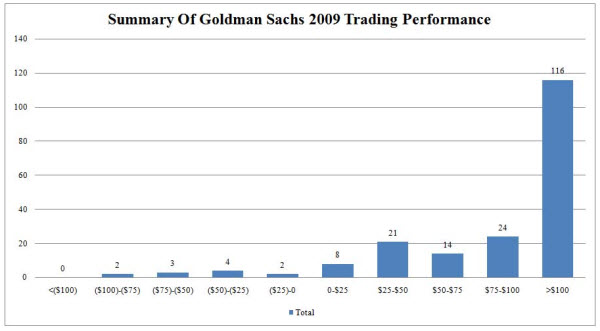Goldman Sachs lost money trading only
one day last quarter, and only two days the prior quarter.
Come on, how could that be? Their boss does say that banks “Do God’s work.” I’m not sure that is a sufficient explanation. When a firm’s trading performance challenges not only all preconceptions of realistic trading, but also of statistical distributions, it’s worth looking into.
Here’s what ZeroHedge has to say about it. Here is a chart that demonstrates Goldman’s YTD trading track record: out of 194 trading days in 2009, the firm has made over $100 million on 116 occasions! This alone accounts for at least $11.6 billion in revenue (and is likely much more).
Yves Smith, at Naked Capitalism, adds: maybe I am just hopelessly out of touch, or perhaps more accurately, the
Fed has created such a ridiculously favorable environment for banks and traders
that if you are moderately competent, making money is like shooting fish in a
barrel. But a winning streak this consistent looks like a rigged game. Is this
just, ahem, “information advantages”? Greater ease in pushing markets around
that have fewer players? Just a function of those monstrously wide bid-asked
spreads? I’m curious for a sanity check from people closer to the action.
The party line comes in the Financial
Times:
The performance – revealed on Wednesday in a regulatory filing – compares
with two losing trading days in the previous quarter and confirms that the
authorities’ drive to revive markets after the crisis is yielding huge windfalls
for some banks.Before the crisis, banks regularly recorded trading losses on several days in
a quarter.Goldman made more than $100m in profits on 36 of the 65 days in the three
months to September and recorded more than $50m in profit on more than eight out
of 10 trading days, the filing shows.These figures were down from the second quarter, when Goldman reported record
trading revenues and had 46 days with $100m-plus in profits. The smaller number
of days with $100m-plus profits in the third quarter partly reflects the bank’s
decision to rein in risk-taking in areas such as interest rates and
equities.
There is a suggestion here that banks like Goldman might be taking advantage
of the Fed and Treasury (although that might be by design, yet another hidden
subsidy).
Let me know what you think about this.
Here is a how there stock is doing.
Here is a link to a prior Goldman Sachs article worth checking-out.


